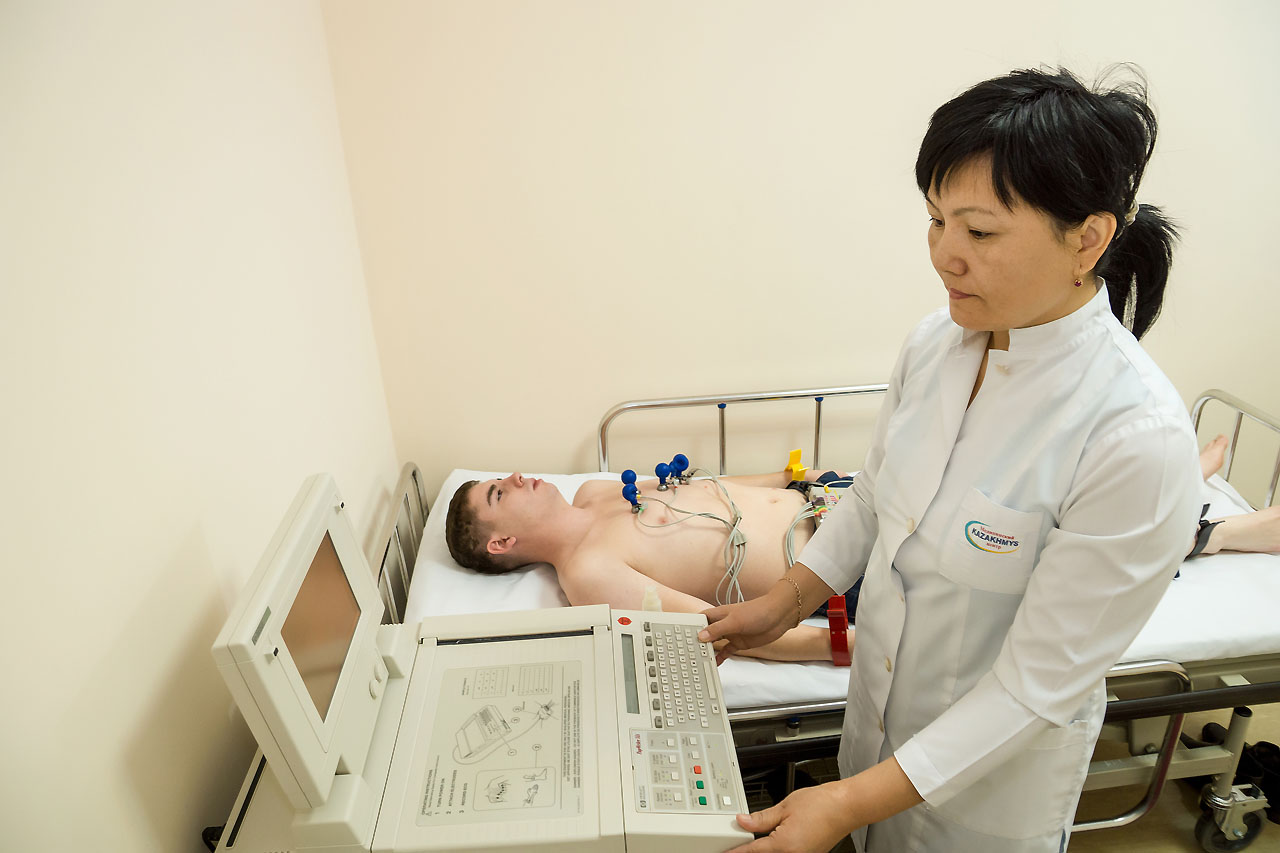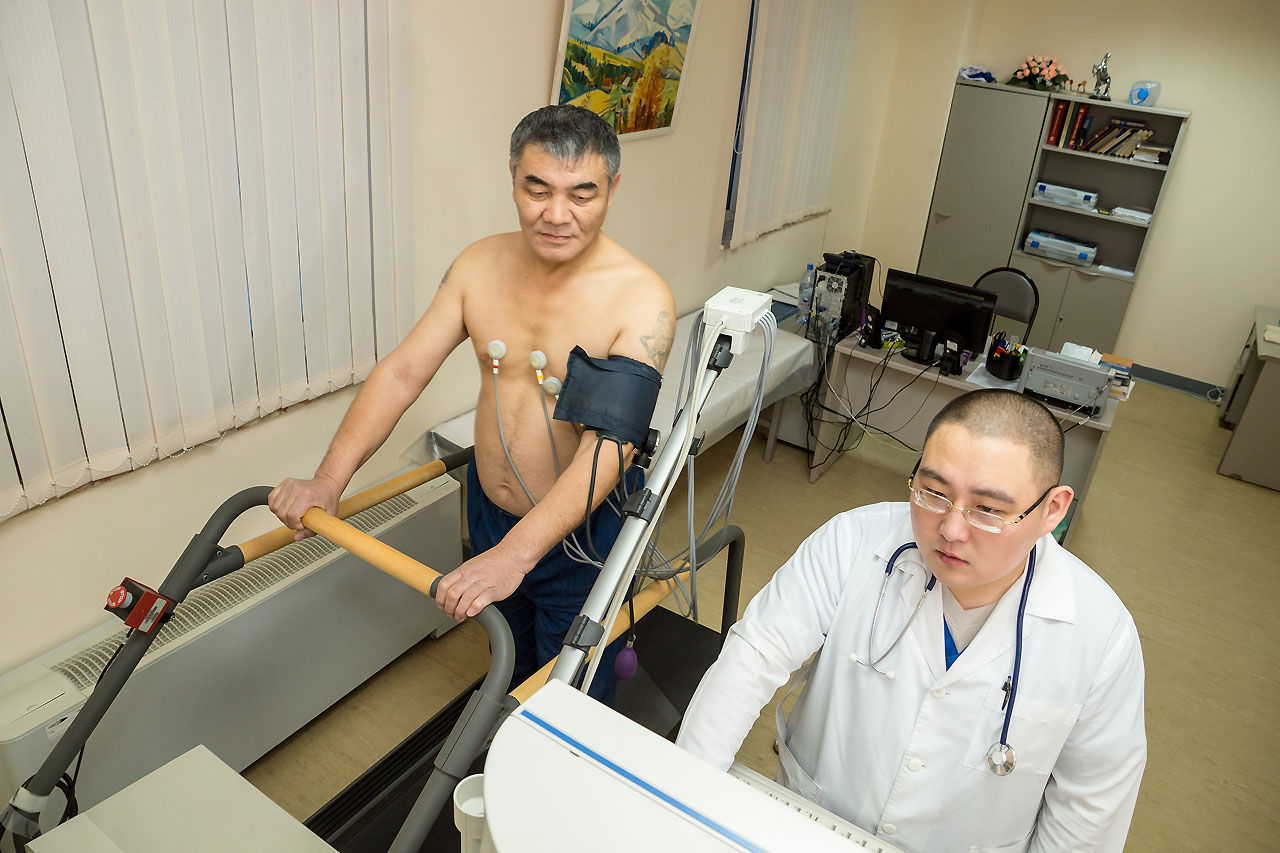Functional Heart Research


Holter ECG - a kind of ECG, which is held for a long time (usually 20-24 hours) in order to detect hidden or transient disorders of rhythm and conduction, as well as, with certain reservations, organic heart lesions (including coronary heart disease, cardiomyopathy, congenital and acquired heart defects).
Daily monitoring of blood pressure - a similar study to determine the level of blood pressure during 20-24 (rarely - longer) hours. Self monitoring resembles the usual definition of blood pressure using an electronic sphygmomanometer, with the only difference that the time and frequency measurements are not determined by the subject himself, and is programmed by your doctor.
These studies are carried out with the help of standalone portable monitors, and does not necessarily require the presence of a patient in a hospital.
It should be noted that the contraindications to this study there is little, but given the fact that it takes a lot of time and effort, it is conducted by appointment only (preferably after consulting a cardiologist). Regarding obstacles to the study, is the idiosyncrasy, mental disorders (including for the elderly), as well as (only ABPM) - frequent rhythm disturbances such as arrhythmia or atrial fibrillation (and that means not actually a contraindication but rather decrease the reliability of the data).
There are certain age limits: Halter usually held for children from 7-8 years, BPM - 12-13 years. However, the physician-researcher in certain cases can both carry out research at an earlier age, and to deny it.
In the study, it is recommended to give up all activities associated with severe and moderate physical activity, even if it is related to work activities (so for people engaged in physical labor is recommended to take the study day hospital or day off). Light exercise is allowed only to the extent permitted by the doctor-researcher. Not recommended for any form of sexual contact.
As for BPM - that, in addition to the above, also recommended the refusal of the management of all vehicles (including bicycles, skateboards, scooters, segways, etc.). On the day of the study, it is required to completely abandon taking a shower. bath, sauna, swimming pool; no plan for the day of the passage of Us- and X-ray studies, physiotherapy, massages and physical therapy (even if something of the following is assigned another doctor, it is recommended to move it to another day). It also requires the rejection of sports (the level of load capacity and other hygiene procedures, etc. must necessarily be negotiated with the doctor).
As some changes which arise on an ECG at heart diseases aren't always present at it at rest, sometimes there is a need "to provoke" their emergence. It can be reached in the different ways, but the simplest – by means of an exercise stress.
Main types of an ECG with an exercise stress is the treadmill-test (the test with walking on a racetrack) and a cycle ergometry (the test on the exercise bike). Treadmill-test is more widespread and more preferable now (as walking is one of the most physiologic and natural types of a load).
As these types of testing are bound to creation for the patient of a physical stress, in difference from an ECG of rest and Holter, for them are available contraindications.
Absolute contraindications to Cycle Ergometry and the treadmill-test (the patient with the below-specified states can't be subjected to a research):
- Acute myocardial infarction (up to 3 weeks)
-
Acute disorder of a cerebral circulation and the state preceding a stroke
-
The unstable or progressing tachycardia
-
Uncontrollable arterial hypertension or the ABP more than 200/110 mm hg at the time of the beginning of a research.
-
Some disturbances of a rhythm and conduction (sinuatrial and atrioventricular blockade 2 and 3 degrees, total block of the left leg of a ventriculonector, Bouveret's diseases).
-
Aortal stenosis of serious degree
-
Thromboembolism of a pulmonary artery
-
Acute thrombophlebitis
-
Acute myocarditis and pericardis
-
The expressed respiratory failure
-
Heart failure in a decompensation stage
-
The stratified aortic aneurysm
Relative contraindications (the research can be conducted, it has to be executed with additional precautionary measures; also the doctor-researcher has the right to refuse his performance or to postpone it for other term).
-
Age more than 80 years
-
Aneurism of heart and (or) vessels
-
Arterial hypertension (at the time of the research ABP more than 170/100 mm hg at rest).
-
Arterial hypotension (at the time of the research ABP less than 90/60 mm hg)
-
Electrolytic disturbances
-
Moderate valval stenoses
- Hypertrophic cardiomyopathy with obstruction of the taking-out tract of a left ventricle
-
Tachycardia of an obscure genesis
-
Syncopal conditions of an obscure etiology
-
Ventricular premature ventricular contraction of high degree
-
Stenocardia attack in day of a research
-
Fever of any genesis
-
Acute pain syndrome of any genesis
-
Inflammatory diseases in an acute stage
- Insufficient preliminary inspection of the patient
- The mental deviations interfering establishment of contact between the patient and the doctor by the researcher.
- Reception of some medicinal preparations (beta-blockers, cardiac glycosides, some hypotensive drugs). Reception of Sodium nitritums – only for stopping of attacks of stenocardia.
- Refusal of the patient for any reason.
If contraindications are absent (or are recognized as the doctor insignificant), then:
The research is conducted in the first half of day
The research is conducted on an empty stomach (as a last resort – a light breakfast not later than 2 hours prior to a procedure.
It is recommended – refusal of smoking in 1 hour prior to the procedure, from a serious exercise stress – in 2 hours prior to the procedure, some medicinal preparations (it is necessary to discuss with the doctor during record in advance) – in 12-24 hours. It is allowed to drink water and other drinks prior to a procedure – except for alcoholic and a coffeine - containing.
The patient needs to have at himself – the out-patient card or a case history, results of an ECG and EhoKG (it is desirable taken out not earlier than in 1-2 months prior to the procedure), if necessary – Holter an ECG. Also at itself to have a towel, removable clothes (at will).
Electrocardiography (ECG) the method of a research of work of heart based on registration of its electric potentials. The electrocardiographic research is carried out by means of the special device – an electrocardiograph. On a thorax, arms and legs elektoda are put, and the elektorokardiograf writes down a kardiagrmma. Before performance of a research it is necessary to be convinced that on a body of the patient there is no jewelry of metal (chains, bracelets, hours, piercing). It is necessary to exempt the top part of a trunk, forearm and anticnemion from clothes. The skin in places of contact to electrodes is degreased by alcohol. Technology of holding a procedure demands that the examined person was in a dorsal decubitus.
That the electrocardiography shows:
- disturbances of a rhythm (tachycardia, bradycardia, arrhythmias, fibrillation of auricles, etc.);
-
disturbances of endocardiac conduction (blockade of the left leg of a ventriculonector, AV-blockade, Frederik's syndrome, etc.);
-
change of the size of cavities of heart, (hypertrophies of ventricles and auricles);
-
the ischemia arising at an ischemic heart disease (coronary heart disease). The ECG allows to distinguish reversible ischemic disturbances at stenocardia and the irreversible changes accompanying a myocardial infarction, at the same time localization and prescription of a necrosis is defined;
-
anomalies of development of the carrying -out ways (a syndrome of WPW or a syndrome of CLC).



